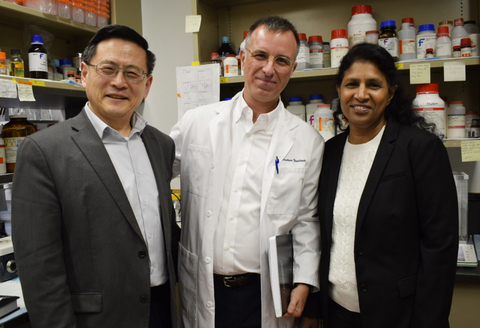The Feinstein Institutes for Medical Research has been awarded a five-year, $2.9 million grant from the National Institutes of Health (NIH) to investigate the potential of human ghrelin, a naturally occurring hormone, as a medical countermeasure against radiation-induced gastrointestinal syndrome (GI-ARS).
This press release features multimedia. View the full release here: https://www.businesswire.com/news/home/20250117181059/en/

Drs. Ping Wang, Max Brenner and Asha Jacob Varghese will lead the study. (Credit: Feinstein Institutes).
This research, led by Ping Wang, MD, professor and chief scientific officer and senior vice president at the Feinstein Institutes; Max Brenner, MD, PhD, associate professor at the Feinstein Institutes; and Asha Jacob Varghese, PhD, associate professor at the Feinstein Institutes, will focus on the protective effects of ghrelin, often referred to as the "hunger hormone," in mitigating radiation-induced intestinal injury. The studies conducted by the team have demonstrated that ghrelin administration can reduce intestinal damage and improve survival after radiation exposure. The recently awarded project will evaluate how ghrelin, which acts on the brain, is able to promote the recovery of intestinal stem cells via the vagus nerve. The team has been collaborating with Kevin J. Tracey, MD, president and CEO of the Feinstein Institutes and Karches Family Distinguished Chair in Medical Research, on this project.
“We are incredibly grateful to the NIH for this funding, which will allow us to explore the potential of ghrelin as a life-saving treatment for GI-ARS," said Dr. Wang. “'Human ghrelin has a positive safety record so far and is easy to produce, making it a strong contender for widespread use in emergencies. We're hopeful this research will eventually result in a real solution for protecting people from radiation exposure."
Nuclear accidents, terrorism and potential warfare scenarios present a significant threat of radiation exposure to civilian populations. High doses of radiation can lead to GI-ARS, a severe condition characterized by damage to the intestinal lining, infections and potentially death. Currently, there are no FDA-approved treatments for GI-ARS.
Ghrelin is a hormone produced primarily by the stomach, and in smaller amounts by the small intestine, brain and pancreas. It's often called the "hunger hormone" because it plays a key role in stimulating appetite. Besides stimulating appetite, ghrelin also influences gastric motility (how the stomach moves food through the digestive system), acid secretion, and has other effects on the body like influencing sleep and mood.
“Radiation sickness, caused from nuclear accidents or from a deliberate attack, is not effectively treatable,” said Dr. Tracey. “With this research support, we will investigate whether ghrelin can mitigate the organ injury and other complications in this condition as the basis to define new therapeutic pathways."
About the Feinstein Institutes
The Feinstein Institutes for Medical Research is the home of the research institutes of Northwell Health, the largest health care provider and private employer in New York State. Encompassing 50 research labs, 3,000 clinical research studies and 5,000 researchers and staff, the Feinstein Institutes raises the standard of medical innovation through its five institutes of behavioral science, bioelectronic medicine, cancer, health system science, and molecular medicine. We make breakthroughs in genetics, oncology, brain research, mental health, autoimmunity, and are the global scientific leader in bioelectronic medicine – a new field of science that has the potential to revolutionize medicine. For more information about how we produce knowledge to cure disease, visit http://feinstein.northwell.edu and follow us on LinkedIn.
View source version on businesswire.com: https://www.businesswire.com/news/home/20250117181059/en/
Contacts
Julianne Mosher Allen
516-880-4824
jmosherallen@northwell.edu
